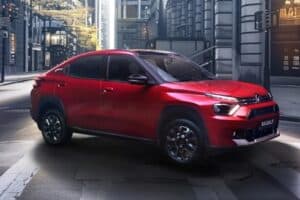D-Max single cab gets incredible 18.15 km for every litre on its long journey from Midrand to Signal Hill.

Driving from Johannesburg to Cape Town on a single tank of fuel is a popular South African challenge that has stood the test of time, with few carmakers attempting it and even less pulling it off.
The two key requirements for vehicles achieving this feat are good fuel economy and a large enough fuel tank, two boxes that are very seldomly ticked by the same car.
One manufacturer brave enough to take on the challenge is Isuzu, which recently embarked on what it calls the One Tank Challenge. The mission was simple; a fleet of five manual 1.9-litre Isuzu D-Max bakkies driven by motoring reporters and influencers set off on the N1 south from Midrand to try and reach Signal Hill in Cape Town on a single 80-litre tank of diesel.
The 1.9-litre turbodiesel derivatives of the Isuzu D-Max produces 110 kW of power and 350 Nm of torque, with Isuzu claiming it will sip 7.3 litre of diesel for every 100 km.
ALSO READ: Isuzu D-Max makes strong statement by outpacing Hilux and Ranger
One frugal bakkie
The winning team’s Isuzu D-Max single cab managed to reach its final destination using exactly 80 litres to cover the distance of 1 453 km. This worked out to a fuel consumption of 5.5 litres per 100 km which equates to covering 18.15 km for every litre.
To prove this was no fluke, two other teams driving double cabs reached Signal Hill on a single tank too, using a few drops of diesel more for record respective fuel consumptions of 5.57 L/100 km and 5.58 L/100 km.
The remaining two teams in single cabs fell agonisingly short. Both needed a refill with the finish line in sight on their way to recording respective fuel economies of 5.92 L/100 km and 6.13 L/100 km.
The average fuel consumption number for the five bakkies was 5.58 L/100 km, which works out to 17.93 km per litre.
ALSO READ: Isuzu D-Max LS a double cab tough enough for any job
No manipulation
The fleet of Isuzu D-Max bakkies took several rest stops on the N1 on its way to Cape Town, for which no time limit was set. The test did simulate real-world circumstances as it meandered through a combination of both flat and mountainous roads with the air-conditioners in operation.
Grant McCleery, head of the Isuzu Driving Academy, also confirmed that the bakkies were not manipulated in any way to aid them in burning less fuel.
“No wing mirrors, aerials or any other items were removed from the vehicles,” says McCleery.
“The diesel fills were monitored and the tanks sealed under independent adjudication.
“Wheel balancing and alignment were checked to ensure that they were within the recommended specification. Tyre pressures were inflated to the maximum recommended limit that the vehicles serviced as per the recommended service schedules.
“The vehicle fuel and oil types were checked and ensured that they were at the right levels.”
ALSO READ: Toyota Hilux, Isuzu D-Max and Ford Ranger rule the roost
An Isuzu D-Max for everyone
According to Kevin Fouche, department executive: product planning and programme management at Isuzu Motors South Africa, the economy sends just the right message to customers.
“From a broader perspective, the underlying message here is that in our product range we have something that caters to all customer needs. For the potential customer looking for a reliable, trusted vehicle and easy on the pocket including overall comfort, we have D-Max options available,” said Fouche.
The Isuzu D-Max range of bakkies starts at R421 200 for the 1.9T single cab base model.
Support Local Journalism
Add The Citizen as a Preferred Source on Google and follow us on Google News to see more of our trusted reporting in Google News and Top Stories.






